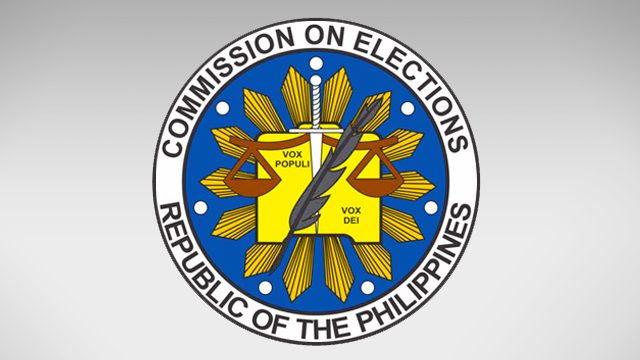SUMMARY
This is AI generated summarization, which may have errors. For context, always refer to the full article.

MANILA, Philippines – The Commission on Elections (Comelec) has affirmed the sufficiency of the recall petition against Mayor Lucilo Bayron of Puerto Princesa City, Palawan.
In a 9-page resolution promulgated on December 29, 2014, the Comelec en banc, voting 6-0, denied Bayron’s omnibus motion for reconsideration (MR) and clarification on the poll body’s decision in April to declare the recall petition as sufficient.
The petition to recall Mayor Bayron was initiated by former city administrator Alroben Goh in March 2014, due to “loss of trust and confidence” in the mayor, after a series of alleged deterioration in the peace and order situation, the city’s poor tourism performance, and other governance issues.
Bayron argued that the recall petition was prematurely filed, as it was done before June 2014, or within his first year in office, thus violating the Local Government Code.
The Comelec ruled that the limitations set by law – a one-year ban after an official’s assumption in office and another one-year ban before a regular election – “pertains to the holding of the recall elections itself” and not to the filing of the petition. (FAST FACTS: The recall process)
“It does not cover preparatory activities like signature gathering. Thus, the gathering of signatures of supporting petitioners can actually start prior to the period of one year after the official, subject of the recall, has assumed office,” the resolution stated.
Not persuaded
The Comelec also dismissed Bayron’s remaining arguments regarding the supposed flaws in the petition itself and the manner by which the Comelec acted upon it.
Among others, Bayron said that primary petitioner Goh “committed a clear act of perjury” as there was an “ostensible improbability” as to the 40,409 signatures the petition has gathered.
He also said that the grounds cited in the recall petition “are unsupported by fact,” and therefore the signatories were led “by deceit by use of fabricated facts.”
The Comelec stood by the findings of Puerto Princesa’s acting election officer (EO), and the certification of its Office of the Deputy Executive Director for Operations (ODEDO) regarding the sufficiency of the recall petition.
EO Roseller Gapulao reported that the 40,409 signatures in the petition were more than 15% of Puerto Princesa’s voting population of 128,899.
Gapulao, in fact, discovered through his own findings that there were actually only 35,731 signatures, and that 1,065 would have to be deducted due to incomplete details accompanying the signature. But even then, the number of supporting petitioners “is more than sufficient to meet the 15% requirement.”
The Comelec also said that Bayron “failed to offer sufficient basis for his allegations of fraud,” adding that he “simply cannot conclude fraud on the basis alone of his victory in the last election” in 2013.
Bayron, who ran under the United Nationalist Alliance (UNA), defeated Elena Hagedorn, wife of longtime mayor Edward Hagedorn, in the city’s mayoralty race.
No schedule yet
The Comelec resolution, however, only ruled on Bayron’s motion for reconsideration. The poll body has yet to set a date for the actual recall elections in the city.
The Comelec-ODEDO hopes that the recall elections would push through before May 2015, or before the start of the one-year ban prior to regular polls.
The poll body is currently in the middle of preparations for the Sangguniang Kabataan (SK or youth council) elections in February 2015, as well as the May 2016 national elections.
“Sa nakikita naman namin, kung masusunod natin ang proseso nang mabilis, aabot naman (The way we see it, if we would follow the process in a fast manner, we could be able to hold the elections in time),” said Campos.
“We will furnish immediately a copy of the decision to the EO concerned. And then the EO will personally serve a copy of the resolution to the petitioner as well as the official sought to be recalled,” said lawyer Mona Ann Campos of the Comelec-ODEDO.
The recall petition would then be posted on public places and published in newspapers of general circulation for 3 consecutive weeks, at the expense of the petitioners. The verification of signatures in the petition would also follow.
It should be noted that in April 2014, while the Comelec affirmed the sufficiency of the Puerto Princesa recall petition, it also temporarily suspended all proceedings on the said petition mainly due to lack of funds.
The following month, it suspended proceedings on all pending recall petitions until the funding issue is resolved.
But in November, the Supreme Court ordered the Comelec to carry out the recall elections in Puerto Princesa. At around the same time, the poll body also decided to resume taking up the other 4 recall petitions.
The power to recall a local elective official due to loss of confidence can be exercised by registered voters of the local government unit (LGU) where the official serves. – Rappler.com
Add a comment
How does this make you feel?





There are no comments yet. Add your comment to start the conversation.